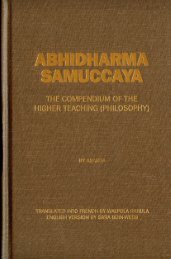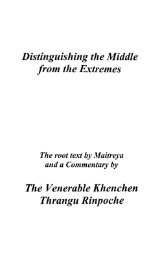ABHISAMAYALAMKARA
ABHISAMAYALAMKARA
ABHISAMAYALAMKARA
You also want an ePaper? Increase the reach of your titles
YUMPU automatically turns print PDFs into web optimized ePapers that Google loves.
ANALYSIS OF<br />
{Abhis. aloka, MS. 247b. 10-14.]<br />
(IV. 14d.).<br />
[Gser. IV. 73a. 5-6.] de-b£in-nid4a mnam-par-bzag~<br />
pm sems de bsdus-pa de-k^o-nar mi-hjig cin tha-snad-da<br />
hjig-par»ses>'pa. 1<br />
5. The Bodhisattva's knowledge about the<br />
B u d d h a*s cognition of no n-c o n c e n-<br />
trated minds which are attracted by the objects of<br />
the external world or, to speak otherwise, distracted.<br />
This distraction may be admitted from the Empirical<br />
standpoint, but not from that of the Absolute. The<br />
distracted minds are those which are not directed towards<br />
the Absolute and not merged in it, being therefore<br />
attracted towards the external world. So are they from<br />
the standpoint of Empirical Reality. On the other hand,<br />
in the aspect of Ultimate Reality they are devoid of<br />
characteristic features and essences of their own. They<br />
do not cease to exist in the sense of momentary disappearance,<br />
nor do they become annihilated in the sense<br />
of a break in a continuity. They are not distracted, since,<br />
(from the standpoint of the Ultimate Reality) there can<br />
be no direction of the minds toward the external objects.<br />
In such a manner (the Buddha) cognizes the true 1 nature<br />
(of the distracted minds).<br />
[Abhis. aloks, MS, 247b. 14—248a. 4.]<br />
THE <strong>ABHISAMAYALAMKARA</strong> 373<br />
6. The Bodhisattva*s knowledge about the Buddha's<br />
cognition of minds, concentrated or distracted in their<br />
indestructible eternal essence from<br />
the standpoint of the A b s o 1 u t e. 1 in<br />
the aspect of the latter they are not liable to destruction<br />
and represent (the immutable element of) Nirvana, having<br />
all the elements that are to be extirpated by means of<br />
analysis and concentration 2 removed, and the five groups<br />
of elements, those devoid of passions and those influenced<br />
by defilement, annihilated. They likewise represent the<br />
complete removal of the Obscurations that are to be<br />
extirpated by means of intuition. The eternal, indestructible<br />
character of the minds is thus cognized.<br />
Owing to his Great Commiseration, the Buddha has<br />
pronounced a blessing, by the force of which his mind<br />
(or spirit) remains existing as long as the world exists<br />
(in order to help the living beings). This mind of the<br />
Buddha, being devoid of the three characteristics peculiar<br />
to the elements that are caused and conditioned, 3 i s<br />
not liable to annihilation', origination,<br />
and (temporary) stabilit}'. It is devoid of<br />
the character of a substratum, and cannot therefore<br />
represent a foundation (in the Empirical sense), 4 infinite,<br />
since it cannot be measured, and inexhaustible like the<br />
Absolute Essence (with which it is identical). It is the<br />
mind by means of which the Buddha cognizes „ from the<br />
standpoint of Ultimate Reality, the immeasurable and<br />
indestructible nature of the minds of the living beings<br />
which is akin to space, 5 as it appears on the surface of<br />
the mirror of his meditative trance.<br />
[Abhis aloka, MS. 248a. 5-14.]<br />
n | (iv. i4d.).<br />
[Gsejf. IV. 73a. 6-b. 1.] de-la mfiam-par~ma-'bzag>



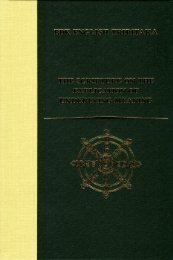
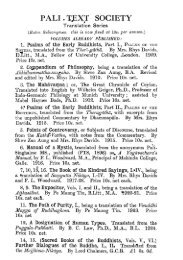


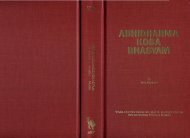



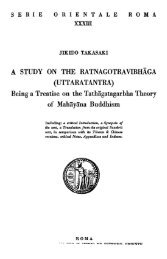
![Long Discourses of the Buddha [Digha Nikaya]](https://img.yumpu.com/32792419/1/164x260/long-discourses-of-the-buddha-digha-nikaya.jpg?quality=85)
